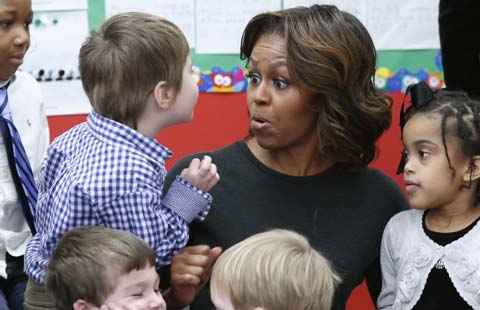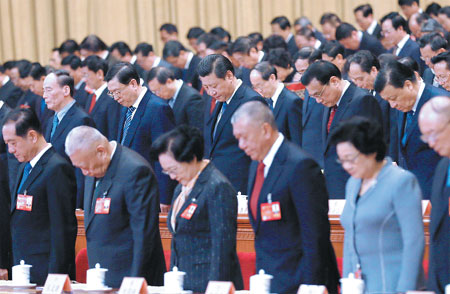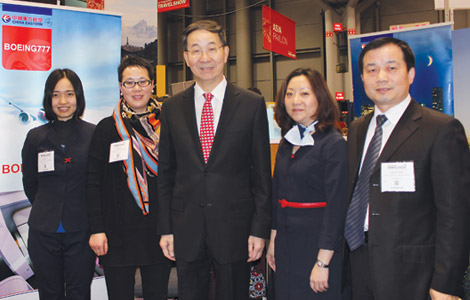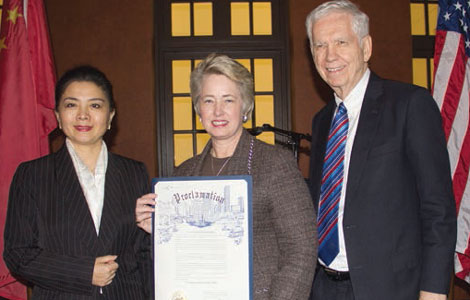GM food safety tests, logos are planned
Updated: 2014-03-05 09:03
By Zhong Nan (China Daily USA)
|
||||||||
System will lead to an improved market environment for shoppers
China is working on an evaluation system for genetically modified (GM) food in order to assess its impact on the environment and human health, a senior official said.
Niu Dun, vice-minister of agriculture and a member of the Chinese People's Political Consultative Conference National Committee, said that because of public doubts being aired about GM safety, China is implementing strict labeling provisions so that all genetically engineered agricultural products that are sold in stores carry a GM logo.
Niu's comment came in response to a comment by another CPPCC member, TV talk-show host Cui Yongyuan, who said Monday that GM corn and rice are being grown illegally on a large scale in grain-producing provinces such as Hunan, Hubei, Jiangxi and Jilin.
"China has never allowed any other GM agricultural products to be planted by farmers or commercialized domestically except GM cotton and papaya," Niu said. "The new evaluation and labeling systems will create a safer market environment for Chinese consumers."
China planted almost 4 million hectares of GM pest-resistant cotton in 2013. The variety has many advantages, one being the capability to increase production per unit by 10 percent, as well as reduce insecticide use by 60 percent, a report by the Beijing-based Chinese Academy of Agricultural Sciences said in February.
The country also cultivated more than 6,000 hectares of GM papaya last year.
Although China achieved its 10th bumper harvest year in 2013, the nation has faced declining arable land amid urbanization, bad weather and pollution from fertilizers and pesticides.
Niu said China will not fall behind in the field of transgenic technology development, because ensuring sufficient grain supply is critical to national development and food security.
To improve the output of agricultural products, China raised its investment in GM technology development and offered subsidies for major grain-producing areas and farming cooperatives. It will also reportedly increase direct subsidies for farmers.
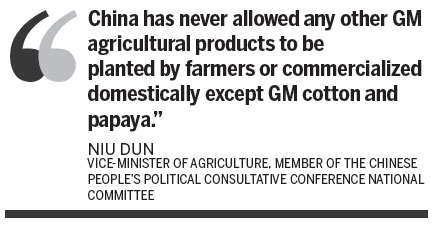
"As a traditional staple food of Chinese, rice has yet to be approved by the government for nationwide commercialization, although two varieties of GM rice have been given safety certificates," Niu said.
"And despite the fact that GM crops can provide resistance to disease, pesticides and climatic conditions, their risks have not been accurately identified, so sales of GM rice are still strictly prohibited," he said.
Last October, 61 members of the Chinese Academy of Sciences and Chinese Academy of Engineering wrote to the central government, urging it to promote GM rice cultivation to gurantee the nation's staple food supply.
To meet the demand for other agricultural products, China imports GM soybeans, corn, cotton, rape and sugar beet from the global market, while soybeans are its largest import for agricultural products.
China imported 63.38 million metric tons of soybeans in 2013, with most GM varieties used as raw material for oil, the General Administration of Customs said.
"More than half of all cooking oil used in China is soybean oil, and 90 percent of that is made from imported GM soybeans, mainly from the United States and Brazil," said Huang Dafang, a researcher from the Biotechnology Research Institute at the Chinese Academy of Agricultural Sciences.
Huang said China's reluctance to adopt GM technology for grain crop usage is largely because it wants to be independent from other nations in terms of food technology.
zhongnan@chinadaily.com.cn
(China Daily USA 03/05/2014 page15)
Most Viewed
Editor's Picks

|

|

|

|

|

|
Today's Top News
Obama, Merkel discuss over Ukraine crisis
US first lady to visit China
Obama releases budget request
China embraces market forces
Sino-Germany electronic trade surges
The bitter truth about too much sugar
US: Train depot attack 'terrorism'
US halts military engagements with Russia
US Weekly

|

|
